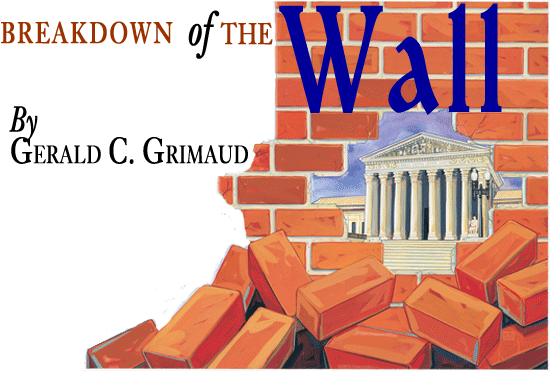Breakdown of the Wall
Gerald C. Grimaud March/April 2003
Getting your Trinity Audio player ready...

Illustration by Jim Mellett
While the Christian Coalition correctly argues that the phrase "wall of separation between Church and State" nowhere appears in the U.S. Constitution, our Constitution does contain these words: "Congress shall make no law respecting an establishment of religion, or prohibiting the free exercise thereof."
Thomas Jefferson in 1802 explained our First Amendment religion provision as providing a wall of separation. The wall metaphor was employed by Roger Williams in 1644, by the U.S. Supreme Court in 1879, and in many cases since. The wall has obviously stood the test of time—at least until Chief Justice William Rehnquist expressly commenced his attack on the wall in his 1985 dissent in Wallace v. Jaffree. The Court, Congress, and Presidents Clinton and George W. Bush have since begun to dismantle the wall brick by brick, law by law, case by case, dollar by dollar, program by program. The wall was weakened as the Supreme Court allowed church and state "cooperation"; disallowing only programs that involved "excessive entanglements" between church and state. The test since 1997, however, now allows government funding of religious social programs, notwithstanding excessive entanglements, as long as there is a secular purpose (see Agostini v. Felton).
With President George W. Bush's current bold and aggressive plan to fund faith-based social programs we are entering a dramatic new era for church-state relations. Neither the president, the U.S. Congress, nor the Supreme Court appears to be concerned with the historical underpinnings of our constitutional religious liberty protections. History has shown us that freedom of conscience cannot exist with the establishment of religion. The establishment clause, the "wall of separation," is unique to the United States. It is essential to protect church and state from each other. The wall took centuries to construct, at great cost.
Our inhumanity to each other more often than not involves religious conflict. This is evident from both recent and current events, e.g., Northern Ireland, Kosovo, and the Middle East. The nature of humanity is not really different in the United States than elsewhere, though we like to think so. What is different is our system of government. Unique to America is the establishment clause, the First Amendment, and strong courts to protect and implement our freedoms. The Bush administration is tampering with our most basic protection, the establishment clause, the first freedom in the First Amendment.
President Bush's supporters argue that his plan to fund "faith-based" social programs is not new; that components of faith-based funding can be found in the government's support of Catholic Charities, the 1996 welfare reform program, HUD's work with Black churches, and Catholic sisters and Jewish community groups that help low-income families with food, shelters, and homes.
It is significant that the rhetoric has gone from "cooperation" between church and state to religious groups "partnering" with government. Amazing!
With the breakdown of the wall of separation, both church and state will pay a great price, as will the individual. Yes, church social programs and the needy will benefit in the short run. However, with state funding comes government intrusion into church programs; forms, applications, questions, monitoring, supervising, auditing, regulating, managing, and even prosecutions. And over time, sadly, the mission of church programs will be neutered.

Gerald C. Grimaud is a former Pennsylvania assistant attorney general. He is engaged in the general practice of law in his hometown of Tunkhannock, Pennsylvania, including constitutional, criminal, and civil rights law.